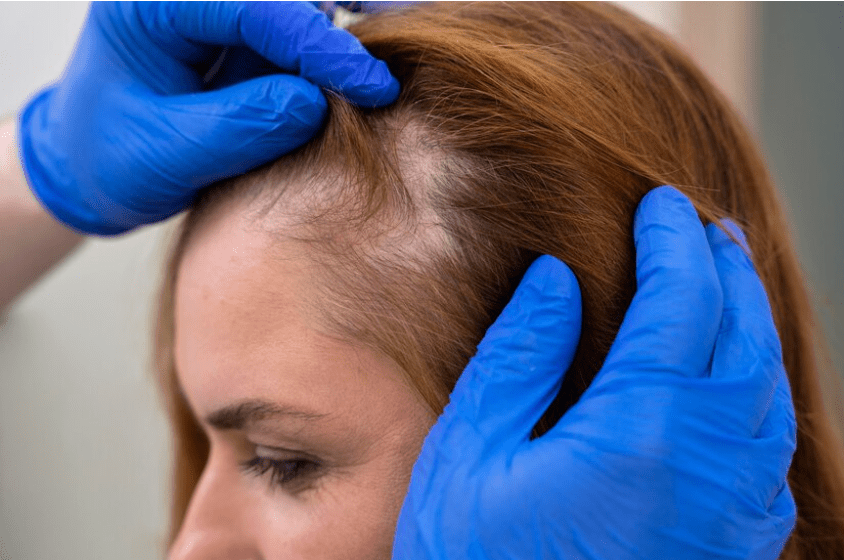Does Ozempic cause hair loss? This critical question has been raised after some users of the injectable medication Ozempic (semaglutide) reported experiencing temporary hair shedding or loss as a side effect.
Ozempic has risen in popularity lately as a successful weight loss solution for patients struggling with obesity or being overweight under medical supervision. It functions by imitating the GLP-1 hormone, thereby targeting receptors located in the pancreas.
This suppresses appetite and promotes feelings of fullness, leading to reduced calorie intake for weight management.
The medication also helps improve blood sugar regulation in adults by releasing the right amount of insulin after eating.
However, with some patients noticing hair thinning after starting Ozempic injections for weight loss purposes, it’s important to analyze the plausible mechanisms for why this hair fallout may be occurring temporarily.
In this comprehensive guide, we’ll examine the science-backed reasons why Ozempic could lead to excess hair shedding, provide tips to mitigate hair loss, advise when to see an expert and summarize the key takeaways on Ozempic’s relation to temporary thinning hair.
Ozempic or Semaglutide and Hair Loss: The Connection
While Ozempic or semaglutide is not indicated formally to cause permanent balding or alopecia, some key mechanisms provide plausibility for why users may notice excessive shedding of hair strands after starting this medication.
Firstly, the rapid weight loss associated with Ozempic or semaglutide can spike stress hormones and shift hormone balances – both changes that can trigger more hairs than normal to enter the shedding telogen phase in their growth cycle. This results in temporary increased hair fall.
Secondly, in some cases, Ozempic may lead to nutritional deficiencies if it causes gastrointestinal issues that reduce nutrient absorption from food. Deficiencies in iron, zinc, protein, and other hair-healthy nutrients could all impede follicle growth.
Lastly, some evidence shows Ozempic could flare underlying illnesses for those prone to autoimmune conditions, leading to alopecia areata and patchy hair loss.
Does Ozempic or Semaglutide Directly Cause Hair Loss
No direct causative link exists between Ozempic as a standalone factor and long-term hair loss conditions like male or female pattern baldness.
In other words, Ozempic or semaglutide itself does not likely damage hair follicles, reduce growth phases, or increase hormone levels like DHT associated with permanent balding.
However, shedding may occur as a side effect if Ozempic indirectly shifts other biological factors tied to temporary hair loss.
As explained above, rapid weight loss, nutritional deficiency, and immune system changes can cause more hairs to shed. For those already predisposed to a hair loss condition, Ozempic could potentially accelerate genetic alopecia.
But in most cases, the distressing hair shedding is temporary rather than representing Ozempic causing permanent hair follicle miniaturization linked to chronic balding disorders.
Main Causes of Hair Loss Explained
To understand why hair fall occurs on Ozempic despite no direct damage to hair follicles, it’s important to review the main triggers that normally cause sudden or gradual hair loss:
- Androgenetic Alopecia: This genetic pattern of hair loss is driven by DHT hormones causing follicle miniaturization. It manifests as a common male or female pattern of balding.
- Telogen Effluvium: When hairs prematurely enter the resting phase, causing the shed of up to 70% of thicker hairs but temporarily. Triggers include nutritional deficiency, post-illness, stress hormones, childbirth, fever, shock to the body, severe weight loss, medications, or hormone changes.
- Nutrient Deficiency: Lack of amino acids, iron, zinc, vitamin D, protein, and other hair-healthy nutrients can impair follicle growth and metabolism. This may result in a loss of density and shine.
- Hypothyroidism: An underactive thyroid means insufficient thyroid hormones that help stimulate new hair growth and shedding cycle.
- Medication Side Effects: Certain prescription medications used for health conditions list alopecia or temporary hair shedding as a potential reaction.
Reasons Why Ozempic or Semaglutide Could Lead to More Hair Falling Out
While Ozempic doesn’t inherently damage hair follicles itself, multiple secondary mechanisms provide a hypothesis for why Ozempic users anecdotally report increased hair shedding:
Firstly, the rapid weight loss associated with semaglutide often spikes cortisol and stress hormones. High cortisol will shift more resting hairs into the shedding phase, causing sudden but temporary loss of density.
Secondly, in some cases, GI issues with Ozempic can make it harder to absorb key hair-healthy nutrients like iron, zinc, and protein from food. Deficiencies accelerate hair falling out.
Thirdly, Ozempic or semaglutide may possibly trigger or exacerbate an autoimmune disorder flair-up for those prone to conditions like alopecia areata. It’s an autoimmune condition that triggers the appearance of uneven bald spots.
Thus, while not a direct cause, Ozempic’s secondary effects on stress, nutrient deficiency, and immunity provide plausible links between usage and sudden hair-shedding complaints.
Tips to Reduce Hair Loss on Ozempic or Semaglutide
If you notice your hair seems to be shedding more on Ozempic or semaglutide, don’t panic, but do take proactive measures to support hair follicle growth and density:
Firstly, replace depleted nutrients through a hair-healthy multivitamin, biotin, zinc, iron, amino acids, vitamin D, and protein supplementation under medical guidance.
Follow an anti-inflammatory diet rich in omega acids, antioxidants, minerals, and compounds that nourish follicles and skin.
Use soothing topical treatments like rosemary oil, caffeine shampoos, and laser devices that encourage thicker, stronger hair regrowth.
Check for underlying issues like thyroid disorders, which require medication if causing hair issues.
See a trusted provider about using proven hair loss treatment options, such as low-level light therapy or topical minoxidil, if needed.
Be patient as normal growth cycles resume post-shedding since hair follicles were not inherently damaged by Ozempic itself.
When to Consult a Doctor
If you are experiencing sudden hair shedding after starting Ozempic or semaglutide, schedule an appointment with hair restoration expert Dr. Lauren Nawrocki of Green Relief Health.
Make sure to monitor the degree of shedding by doing a hair pull test to quantify daily hair loss. If large clumps are falling out or you see patchy bald spots start to appear, promptly consult Dr. Nawrocki or your physician.
Excessive rapid shedding with extreme loss of density may indicate an underlying issue that needs medical diagnosis rather than the normal increased loss from a medication adjustment.
Dr. Nawrocki can help identify the root trigger causing hair issues, recommend lab tests related to nutritional deficiency, thyroid disorders, or hormone imbalance, and advise treatment options like PRP injections to stimulate regrowth.
Catching sudden hair shedding early and taking preventative steps helps minimize the appearance of loss while hair cycles stabilize post-Ozempic initiation.
Wrapping Up
In summary, while the GLP-1 drug Ozempic or semaglutide does not inherently cause male or female pattern balding or permanently damage hair, users may experience temporary telogen effluvium-like excessive hair shedding as a side effect triggered by secondary mechanisms.
Potential contributing factors include rapid weight loss, spiking stress hormones, GI issues reducing nutrient absorption, or flare-ups of autoimmune susceptibility – all changes that can shift more hair to enter the resting phase and result in sudden loss of density.
Using hair-healthy supplements, following a nutritious diet, diagnosing underlying issues, seeing a dermatologist promptly, and allowing normal cycles to resume reduces the appearance of thinning hair.
Most importantly, Ozempic itself does not cause scarring alopecia or permanent hair follicle miniaturization. With vigilance, sudden shedding can be managed without long-term baldness setting in.
So while distressing, take heart – the hair loss is likely temporary rather than causing lasting balding disorder.







